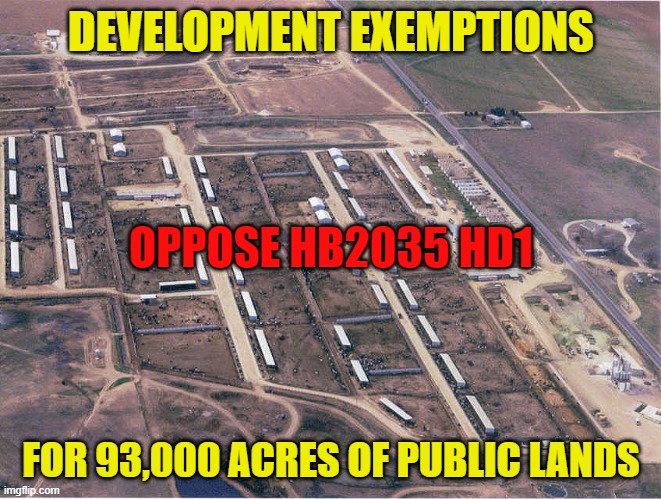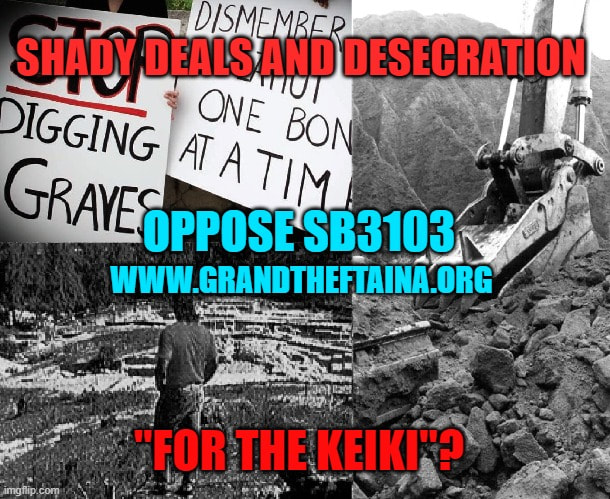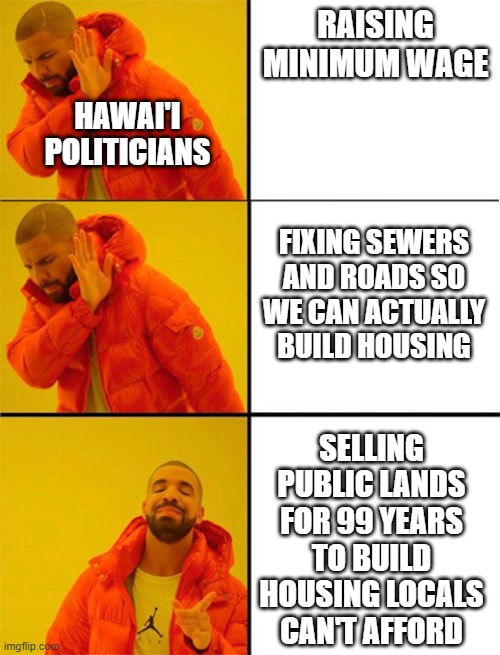|
This weekend, take a moment to OPPOSE HB2035 HD1, another "pasture" lands transfer bill, which has a hearing on Monday before the Senate Water and Land Committee and Senate Agriculture and Environment Committee (sample testimony and email information below).
(Thank you to all who testified on SB2812. There was healthy opposition but strong support from ranches and their affiliates. The measure passed, with amendments). Quick summary: HB2035 HD1 would allow the board of agriculture to exempt development projects on 93,000 acres of public "pasture" lands from any law relating to "the development or improvement of land" and the "constructing of buildings thereon," and to issue or renegotiate new and current leases for these lands. These lands contain native and endangered species habitats, cultural sites, hunting areas, and other public trust values likely to be overlooked in the department of agriculture's leasing provisions, or in the board of agriculture's granting of environmental and other exemptions for development projects. For more information see previous post here. Please and especially if you live or know people who live in the districts of WTL Chair Kai Kahele (Hilo) and AEN Chair Mike Gabbard (Kapolei, Makakilo, Kalaeloa, 'Ewa, Waipahu), this weekend is a critical time to send an email, or make a call, to ask them to HOLD HB2035 HD1. Sen. Kahele: 586-6760, senkkahele@capitol.hawaii.gov Sen. Gabbard: 586-6830, sengabbard@capitol.hawaii.gov Otherwise, you can also e-mail testimony by this weekend to wtltestimony@capitol.hawaii.gov, aentestimony@capitol.hawaii.gov. Sample testimony: "Dear Chairs Kahele and Gabbard, Vice Chairs Keith-Agaran and Ruderman, and members of the Senate Water and Land and Agriculture and Environment Committees, I OPPOSE HB2035 HD1 because it will let private ranches ignore the public interest in nearly 100,000 acres of public lands, and enable the destruction of natural and cultural resources, the blocking of access to hunting grounds and cultural sites, and the development of public lands with a broad range of environmental and land use exemptions. Nothing is stopping private ranches from continuing to use these public lands for their cattle operations, in balance with the many other interests and concerns of hikers, hunters, Native Hawaiian cultural practitioners, conservationists, and others in these lands. Please HOLD this measure and protect the public trust in our limited public land base. Thank you, (your name)"
0 Comments
See below the post for legislators you can contact and a sample message you can use to help stop this bad bill! Exempting a new "school facilities agency" from public spending and environmental laws seemed like a bad idea to the vast majority of respondents to a March 5 Star-Advertiser poll. A follow-up editorial largely trashed the proposal in SB3103 SD2. Other commenters did as well. Most critics have focused on the agency's ability to avoid procurement laws, designed to prevent corruption and the shady or wasteful spending of taxpayer dollars; others have highlighted its qualified exemption from environmental review (i.e. environmental impact statement) laws, designed to ensure that threats to the environment or public health (like when you build on toxic waste) are properly and publicly evaluated (with public input) during project planning. (Side note: Just last year, 18 out of 23 schools surveyed by the Department of Education were found to have "elevated" levels of lead, arsenic, or chlordane in their soil; most if not all were likely built well before our environmental review laws were enacted). Less publicized has been the agency's wholesale exemption from "Chapter 6E", the state laws that:
Should SB3103 SD2 pass as drafted, the new school facilities agency would be completely exempt from Chapter 6E. Its projects could break ground without historic preservation review, without an archaeological inventory survey, without consultation with any island burial council or cultural monitor or anyone at all, and could knowingly plow through Native Hawaiian or other ancestral graves or priceless historic artifacts without consequence. Last year marked the 30th anniversary of the re-interment of over 1,100 iwi unearthed during construction of the Ritz-Carlton in Kapalua, before Chapter 6E existed. A large part of Chapter 6E was enacted as a result of the uprising that occurred after news broke of the destruction of Native Hawaiian burial grounds, and Native Hawaiians organized. Even with these additional laws, a MASSIVE amount of development has occurred since then, without an exemption to any of Chapter 6E's requirements, and with far less desecration than would likely have occurred. Why are legislators now just throwing Chapter 6E in its entirety in the dumpster, for this new and nearly all-powerful development agency? One final note -- the school facilities agency, administered and run almost entirely by the Governor's appointees, would also have the power to sell public lands for up to 99 years to private developers under SECTION 8 of its current draft. We tell our children, don't cheat, don't take shortcuts, don't disrespect your elders. So why give a "school facilities agency" and its developers permission to do just that -- cut shady deals, avoid environmental laws, and all but destroy the bones of our ancestors? SB3103 SD2 is a dumpster fire waiting to happen. Maui residents! Your representative, Lower and Higher Education Committee Chair Rep. Justin Woodson (Kahului, Puʻunēnē, Old Sand Hills, Maui Lani) (808-586-6210 or repwoodson@capitol.hawaii.gov), is one of the lead legislators who is being pressured to pass this bill.
The other is Finance Committee Chair Sylvia Luke (Makiki, Punchbowl, Nu'uanu, Dowsett Highlands, Pacific Heights, Pauoa) (808-586-6200 or repluke@capitol.hawaii.gov). Other Lower and Higher Education and Finance Committee members can be found here: LHE Committee FIN Committee Know any of these legislators? Do they represent your home? If so-- Please take a moment and help get others to call or e-mail them, to let them know SB3103 SD2 is a bad idea. Sample e-mail message: "Dear Representative __________, Please stop SB3103 SD2. While I support addressing our school facility needs, an agency exempt from procurement, environmental, and historic preservation laws will invite far more harm than good. These laws keep our children safe, uphold the trust of taxpayers, and stop the outright desecration of all ancestral remains, Native Hawaiian or otherwise. Please do not hear this bill or vote for its passage. Thank you for your consideration of this request. Signed, (your name)" UPDATE: HB2035 has a hearing scheduled for Monday, March 16, 2020 at 1:20 p.m. in the Hawai'i State Capitol conference room 224, before the House Water, Land, & Hawaiian Affairs Committee. REVIEW THE BILL AND SUBMIT TESTIMONY IN OPPOSITION HERE. (see below for sample testimony) UPDATE ON SB2812: WLH voted to PASS, WITH AMENDMENTS. Ayes: Yamane, Todd, Har, Tarnas, Ward; Reservations: Lowen; No: Wildberger. 93,000 acres. Equivalent in size to well over half the entire island of Moloka'i (and nearly twice the size of Moloka'i Ranch), or 900 Aloha Stadiums (parking lots included), or 70,500 football fields. That is how much public land on Hawai'i Island alone - including relatively untouched native forests, endangered species habitat, public hunting areas and access corridors, and countless cultural resources and sites - that would be transferred to the Department of Agriculture under SB2812 and HB2035, to renegotiate and issue new leases to powerful Hawai'i Island ranches for cattle grazing and livestock production. These ranches -- who no longer want to abide by the conditions and requirements placed by the Department of Land and Natural Resources on their use of public lands -- believe that the Department of Agriculture will give them much more favorable lease terms, and are lobbying HARD for the passage of these bills. And the Department of Agriculture, via spokesperson (and former HART deputy director) Morris Atta's testimony, is more than happy to take control of these lands, because "the industry wants it." Not only does the Department of Agriculture lack the mission, expertise, or staff to consider and take care of the environmental, cultural, and subsistence value of these lands, it also, through its board, has the power to exempt "agricultural" developments from almost every environmental and land use protection law. Despite valid and clearly justified concerns from the Department of Land and Natural Resources and the Office of Hawaiian Affairs, and the Department of Agriculture's complete inability to articulate why a wholesale transfer of these 93,000 acres would support the public's interests (other than because "the industry wants it"), Senators and Representatives thus far have caved to the political pressures of Hawai'i Island's ranching lobby and their allies. The kicker? 43,000 head, or 80% of the cattle raised on Hawai'i ranches marketed in 2018 were exported to the mainland. So why are certain ranch lobbyists claiming they are contributing to our local food security and carbon reduction goals? How dumb do they think our legislators are? Review the testimonies submitted on these measures here and here, and submit your own when a hearing is scheduled. UPDATE: HB2035 HAS A HEARING scheduled for Monday, March 16, 2020 at 1:20 p.m. in the Hawai'i State Capitol conference room 224, before the Senate Water and Land and Agriculture and Environment Committees. REVIEW THE BILL AND SUBMIT TESTIMONY IN OPPOSITION HERE (or e-mail wtltestimony@capitol.hawaii.gov and aentestimony@capitol.hawaii.gov) AND SPREAD THE WORD! "Dear Chairs Kahele and Gabbard, Vice Chairs Keith-Agaran and Ruderman, and members of the Senate Water and Land and Agriculture and Environment Committees, I OPPOSE HB2035 HD1 because it will let private ranches ignore the public interest in nearly 100,000 acres of public lands, by enabling the destruction of natural and cultural resources, the blocking of access to hunting grounds and cultural sites, and the development of agricultural facilities without environmental review or land use legal protections. Nothing is stopping private ranches from continuing to use public lands for their cattle operations, in balance with the many other interests and concerns of hikers, hunters, Native Hawaiian cultural practitioners, conservationists, and others in these lands. Please HOLD this measure and protect the public trust in our limited public lands. Thank you, (your name)" Share this meme - Download here. or make your own! #grandtheftaina SB3104 SD2 does a lot of things, but there are 2 things that should concern every person who loves and pays taxes in Hawai'i:
1. It would allow for the sale of Hawai'i's public lands for up to 99 years, for "affordable" housing projects that may be priced so high as to be unaffordable to over 70% of state residents. 2. It would severely limit the ability of native Hawaiians or a re-established Hawaiian Governing Entity to negotiate claims to leased "ceded" lands, which many consider to be "stolen" from the Hawaiian Kingdom, and which the state constitution considers to be held for the benefit of "native Hawaiians and the public." Also, neighbor islands residents especially should pay attention to the Land Use Commission provisions of this measure. The current draft of SB3104 (and a few other bills for that matter) would make it easier to expand urban areas into agricultural and rural lands, by further limiting the Land Use Commission's role in taking public testimony and placing conditions on the proposed urbanization of these lands. Expansions of the urban district of up to 25 acres per development will no longer require Land Use Commission oversight for most agricultural and rural lands. Finally, while this measure is pitched as an affordable housing silver bullet, almost none of its provisions actually address the biggest obstacle to housing development, at least on O'ahu where the demand is the highest: sewage. Doodoo water. Between residents, kōlea birds, stationed military, and tourists, there's too much human waste and not enough pipes and treatment facilities to keep it from turning our nearshore waters into a staph infection risk zone. The Governor, an engineer, has himself said something to the effect that "the crumbling sewage system is the main contributor to Hawaii's [sic] housing development problem." Other much touted, photo-op worthy affordable housing initiatives have failed to hit their marks because of sewer capacity issues and will continue to do so unless these issues are addressed. Next stop for this bill is Committee referrals and then a likely single (1) public hearing, likely very soon. There may be only 1 chance for the public to weigh in on this measure. Want to help? Share this post or download a meme here (or make your own) to help bring more awareness to this bill. Or contact one of the many groups engaged on this bill to pitch in with their strategies. Learn more! Civilbeat.com has a couple articles on the discussion-worthy amendments made to the measure in the Senate Housing Committee, and on the removal of those same amendments by Senate Ways and Means Chair Donovan Dela Cruz. The testimonies on the bill status page, right-hand side also provide various perspectives on the bill as well. |
JOIN THE FIGHTPlease share our news and memes, and link back to our website to help spread the word to those who should care. Archives
April 2021
Categories
All
|




 RSS Feed
RSS Feed
